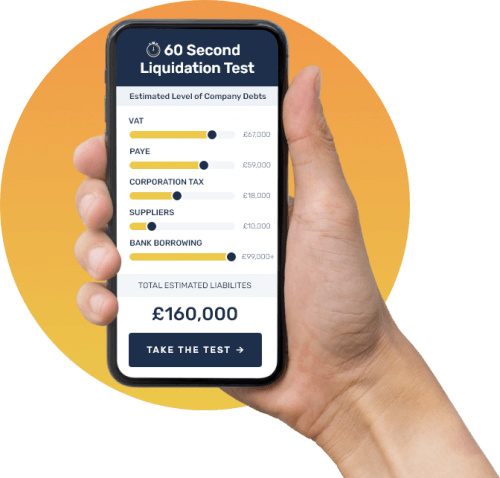Should I strike off or liquidate my company?
If your limited company has no debts, you can close it down either by striking it off the register at Companies House or using a formal liquidation procedure. Voluntary strike-off, also known as dissolution, places the responsibility for closing down the company firmly with yourself and other directors.
Voluntary liquidation, on the other hand, is an official process undertaken by a licensed insolvency practitioner (IP). The cost of liquidating is considerably more than strike off, but there can be serious ramifications if you try to strike off your company and don’t meet the stringent requirements.
So looking at voluntary strike off first, what are the eligibility criteria you need to meet to ensure you aren’t at future risk of either disqualification as a director or personal liability?
What is limited company strike off?
Limited company strike off – sometimes known as dissolving a limited company – is an informal way of closing down a limited company which is no longer required. This could be because the company has ceased trading, the director is approaching retirement, or simply because the directors have no desire to continue running the business.
A company director can voluntarily request that their company is struck off the register by submitting a DS01 form to Companies House online and paying the appropriate fee. A copy of the DS01 form must also be sent to any party who could be affected by the company's dissolution such as members (shareholders), creditors, employees, and any directors who did not sign the DS01. This must be done within 7 days of you submitting the DS01 form to Companies House.
Following your submission of the DS01 form, a notice will be placed in the Gazette declaring your intention to strike off the company, and following a period of two months – supposing no objections have been received – the company’s name will be removed from the register held at Companies House and it will cease to exist as a legal entity.
This is a relatively quick and inexpensive process, however, strike off is only suitable for certain companies in a particular set of circumstances. Strike off is designed as a simple and informal way for a company with no outstanding debt, legal proceedings, or substantial assets to close down in an efficient manner.
If your company is in debt, or conversely, has a significant amount of money or assets, strike off is not likely to be appropriate for your situation. However, there are formal procedures which you can utilise to close down your company depending on the financial position at the time of closure.
Eligibility requirements for voluntary strike off
There are specific requirements that you need to meet before you can strike your company off the register at Companies House. Briefly, these are:
- Ceasing trade and other business activities for three months prior to strike off, apart from those required to wind up the company
- Not changing the company name during the three months leading up to strike off
- Being solvent, with no threat of liquidation present
The last point is particularly important when you’re striking off your company, as this method of closure is for solvent businesses only. If you attempt to strike off a company that owes money, you could face allegations of misconduct and even personal liability for the debts involved.
Worried about your Bounce Back Loan?
If you are a limited company director worried about how you are going to repay your Bounce Back Loan, we are here to help. As licensed insolvency practitioners we can talk you through your options when it comes to repaying your outstanding Bounce Back Loan, as well as handling all negotiations with creditors on your behalf. Call our team today on 0800 063 9262 .
What happens if your strike off request is objected to or challenged?
While some strike off applications – both voluntary and compulsory – go through unchallenged, in some cases, an objection will be raised which will halt further action being taken and prevent the company from being dissolved.
If you have voluntarily submitted a strike off application to have your company dissolved and have been met with an objection, the first step is to determine the reason why. In the vast majority of cases, this will because a creditor of the company has been informed of your intention to dissolve the business and has formally raised an objection to Companies House to prevent this happening.
If you attempt to dissolve your company while having unpaid debts, it is highly likely you will encounter objections to the proposed strike off. This is because once a company has been dissolved, it ceases to exist as a legal entity, and creditors therefore stand to lose any money owed by the company unless they pay to reinstate it at a later date. Due to this, it is in the creditors interest to object to the planned strike off in order to ensure the company remains active until the money owed has been repaid.
If you are unable to settle the debts of the company prior to strike off, you will need to consider closing the company through a formal insolvent liquidation process such as a CVL.
Disadvantages of voluntary strike off
- Creditors can oppose a strike off – HMRC are known to quickly oppose such a move if you have tax debts, and will then attempt to force your business into compulsory liquidation.
- Directors must ensure all creditors are informed - the company can be reinstated for up to 20 years after closure if a creditor subsequently makes a claim. It would be treated as if strike off hadn’t taken place, and your conduct as a director would be investigated.
- Directors face serious repercussions if the company is insolvent, including personal liability and disqualification for up to 15 years.
Alternatives to strike off: Company Liquidation
If strike off is not appropriate for your company, you may instead need to consider liquidation. Liquidation is similar to strike off in that it ultimately brings an end to a business which is no longer needed. There are two main types of liquidation and the one which is right for your company will depend on its financial position at the time of liquidation
Solvent Liquidation via Members' Voluntary Liquidation (MVL)
A Members’ Voluntary Liquidation (MVL) is a formal procedure whereby the business is wound up by a licensed insolvency practitioner. Again, the company must be solvent to be eligible for this process, and you sign a formal Declaration of Solvency in this respect.
This means you believe the company can repay all its debts, plus interest, within 12 months of closure. A licensed IP carries out the procedure and ensures you meet all your statutory obligations as a director, so minimising the potential for problems in the future.
Insolvent liquidation via Creditors' Voluntary Liquidation (CVL)
If the business is found to be insolvent, voluntary liquidation by way of a Creditors’ Voluntary Liquidation (CVL) could be the most appropriate option. A CVL is initiated by the company's directors once they realise that their company is insolvent and its problems have taken it beyond the point of rescue. A CVL brings about the end of an insolvent company in an orderly manner, while ensuring all creditors are dealt with fairly and in accordance with the Insolvency Act 1986.
A CVL must be overseen by a licensed insolvency practitioner who will handle the entire process on behalf of the company’s directors. As part of their role, the appointed insolvency practitioner will be responsible for identifying company assets, dealing with outstanding creditors, and ensuring any distributions are made according to a set hierarchy of priority.
Once this has been done the company will be formally dissolved at Companies House and will no longer exist as a legal entity. Any remaining debt will be written off unless this has been personally guaranteed by directors. As part of the process, you may also be entitled to director redundancy if you meet the criteria.
Strike off or liquidation?
To answer the question, “Should I strike off or liquidate my company?” you need to consider what would happen to existing debts. If you can’t repay them and try to strike off the company, the application would be challenged. Furthermore, if a creditor files a claim for a debt in the future, the company will be reinstated.
When you liquidate a company, if it’s insolvent, any unpaid debts that remain are officially written off so there’s no chance of being held personally liable for them in the future. The business is closed down in an orderly manner when you opt for solvent or insolvent liquidation, and you gain the support of a licensed professional.
Start your online liquidation today
If you have decided liquidation is the right option for your limited company, you can take the first step and begin the process online using our online portal. Starting the process is quick, simple, and can be done at a time that suits you. Your information will be submitted to your local UK Liquidators insolvency practitioner who will be with you every step of the way. Click here to start your company’s liquidation online.
Our expert team at UK Liquidators has more than 25 years’ experience of helping directors voluntarily liquidate their companies. We can provide more detail on director redundancy and your potential eligibility, and guide you on the best way to close your company. We operate a wide network of offices around the country – please contact one of the team to arrange a free same-day consultation.
If you are considering liquidation for your limited company, taking advice from a licensed insolvency practitioner can help you understand your options.
Take our 60 second test and find out













